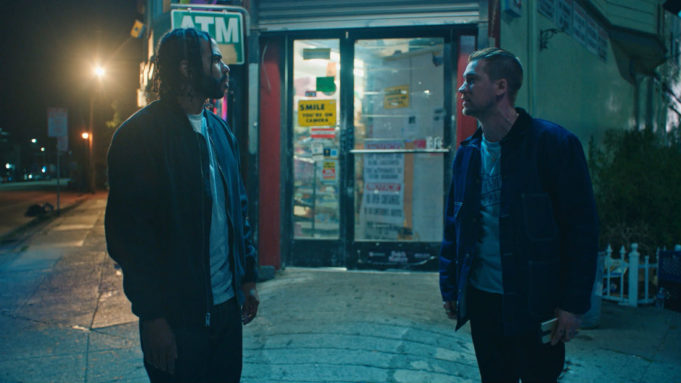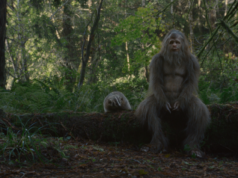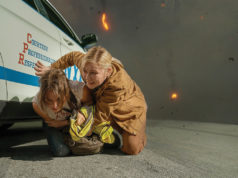They say three makes it a trend, so here we have three movies in Black Panther, Sorry to Bother You, and Blindspotting, which comes out in various Tarrant County theaters this week. As wildly different as they are from one another, they’re all set in Oakland (at least partially), they all feature black men as main characters, they all tackle the subject of race in both potent and layered terms, and they all happen to be among 2018’s best movies. No wonder various cultural critics are saying that the home of the Golden State Warriors is having a moment in the sun. Yet this blazing movie has its own voice and its own concerns rooted in Oaktown but easily recognizable to those of us here in another city in the shadow of a larger one down the freeway.
Screenwriters Daveed Diggs and Rafael Casal also co-star in the film, with Diggs being known for winning a Tony for Broadway’s Hamilton. He plays Collin Hoskins, a convicted felon with three days left in his 12 months of probation, who tries to express his dreams and cope with his troubles by composing rap verses with his childhood best friend Miles (Casal). He’s driving home one night to make his curfew when a terrified black man runs across his path, and Collin watches a white cop (Ethan Embry) shoot the man in the back four times as he flees. Collin would rather forget the incident — he imagines coming forward: “Hello, police? I’d like to report a murder that you did” — but he remains haunted by images of the dead man lying in the street. A more immediate problem is Miles, a white guy who insists on acting the thug unlike Collin, talking in ghetto slang, wearing grills, and illegally buying a gun off his Uber driver.
The whole story plays out against the backdrop of a rapidly gentrifying Oakland, invaded by mostly white out-of-towners attracted by cheap real estate, who think they’re doing the community a favor by tearing down the local grocery store and putting up a Whole Foods. Diggs and Casal are savvy enough to consider that gentrification might not be all bad: Collin’s mom (Margo Hall) refuses to upsell her house, saying, “I ain’t leavin’ now I can actually get good food.” A white photographer (Wayne Knight) who bemoans the loss of Oakland’s old houses and oak trees is painted in ridiculous tones as he begs Collin and Miles to stare deeply into each other’s eyes.
Yet while the bearded dude who rides by on a five-foot-tall bike might be harmless, it’s hard not to sympathize with Miles’ outrage when he finds his favorite greasy-burger chain now catering vegan patties to Silicon Valley parties. This is part of a slowly building scene where Miles finds that the hipsters all have the same tattoos as him and then finally snaps when a black party guest lumps him in with the white culture vultures. Collin’s crime is revealed to us by a gleeful witness (Utkarsh Ambudkar, making the most of a showpiece monologue) who tells his boyfriend the story, and the scene is horrifying and funny, because the guy is so jazzed to recount an obnoxious white hipster receiving a beatdown that he doesn’t see how mortified Collin is about his part in it. The issues between Collin and Miles come to a head in a furious argument outside a bodega, as Miles is going about his legitimate grievances all wrong. He doesn’t seem to realize that no matter how much he waves his gun around, he’s still less likely to get shot by the cops than his buddy, the black guy with the cornrows.
This is a devastatingly surefooted debut by music video director Carlos López Estrada, who injects this drama about class and race issues with the nervous, bopping energy of Spike Lee’s early films. He knows when to be funny and when to be serious, when to be in your face and when to pull back, and he’s not afraid to dive in when rap numbers break out, as in a nightmare sequence when Collin dreams he’s back in court being prosecuted by Miles. Latinos have been largely left behind in this great resurgence of African-American cinema, so the presences of Casal and López Estrada offer hope that they might establish their own beachhead on our screens.
The movie climaxes with Collin and Miles’ jobs as movers bringing them face to face with the cop once again, and while I love the idea of a rap monologue in this place, it doesn’t really come off. The scene might have been better played straight, as evidenced by the exchange afterward between the cop and Miles that’s more powerful for being only two lines. Still, when you have something this thoughtful and visceral at the same time, complaining about the possibility of too many ideas is just ungrateful. Blindspotting takes its title from a conversation between Collin and his psych student ex-girlfriend (Janina Gavankar), referring to the blind spots all of us have in our racial and class awareness. This hilarious, provocative, and unsettling film shines a light.
Blindspotting
Starring and written by Daveed Diggs and Rafael Casal. Directed by Carlos López Estrada. Rated R.












